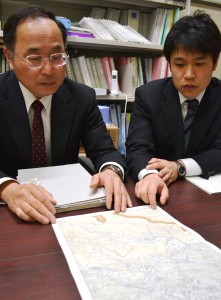Hiroko Obara
Enterprises based in foreign countries such as China are recently expanding purchases of land and forests in Japan to start solar power generation projects. Since there are no obligations for them to consult local governments in advance to set up solar panels, some projects have led to disputes with nearby residents because they have been implemented without local approval. Some worry that the panels could turn into industrial wastes after the feed-in tariff scheme for renewable energy ends, while others are concerned over their possible adverse impact on the ecosystems.

Officials of Nishigo, Fukushima Prefecture, show a map to explain about the land obtained by a foreign firm.
In the northern part of Nishigo village in Fukushima Prefecture lies a 130-hectare land which has been abandoned for more than two decades after a golf course construction plan was deadlocked. Late last year, the local government found out that a Chinese firm purchased 50 hectares of the land to build a solar power plant. A researcher going after the issue of foreign firms’ land acquisition informed them of the project.
A local government official said they never dreamed of a foreign firm acquiring such a devastated land which is difficult even to enter.
The firm which obtained the land failed to report the purchase to the prefectural government as required under the National Land Utilization Law, but the failure to report does not invalidate the purchase contract. The prefectural government directed the firm in February to report the acquisition, and the firm reportedly completed all the necessary procedures.
The official expressed anxiety over the fact that the construction plan is proceeding without sufficient consultation with local residents, saying that it would be difficult to impose any restrictions on the plan now that all the paperwork is completed.
In Yufuin in the city of Yufu, Oita Prefecture, local residents raised a protest campaign against a Chinese firm’s purchase of a 90-hectare land to construct a mega-solar facility. In response to the move, the Yufu municipal government adopted an ordinance which obligates firms with a mega-solar plant construction plan to consult local residents beforehand.
Keiko Fujisawa, 61, who filed a petition with the municipal government, said she saw a company official who spoke a foreign language looking around the neighborhood, and asked him not to destroy the scenery of Yufuin. According to Fujisawa, the official replied using an interpreter that once a firm acquires land, it can be utilized in any way the firm likes.
Fujisawa said the firm does not appear to have any intention of making contribution to the local community by boosting its economy or increasing its energy self-sufficiency. Rules should be created on a national level to restrict entries of firms which are seeking only profits, she added.
Japan’s feed-in tariff system which began in 2012 guarantees the world’s top-level prices for selling electricity generated using renewable energy. Many foreign firms are entering the nation’s solar power market to benefit from the scheme, causing disputes with local residents in some cases.
In Hiroo, Hokkaido, where a Chinese firm was planning to buy a 360-hectare forest to build a solar power plant, a local forest owners’ cooperative asked tree owners to take legal action against cutting down their trees, eventually managing to stop the firm from purchasing the land.
Yoshihisa Kubo, head of the cooperative, said that if the trees were cut down and solar panels were set up, it would destroy the ecosystems including endangered endemic species such as Blakiston’s fish owls, and would have grave effects on the regional agriculture, forestry and fisheries industry. It is important to create a system in which local residents can get more involved in mega-solar facility construction plans, Kubo said.
(April 29, 2014)

